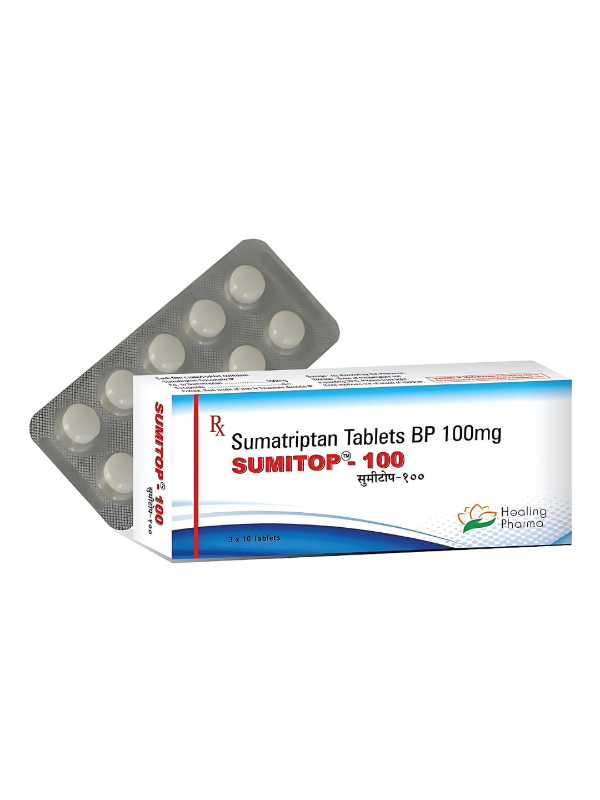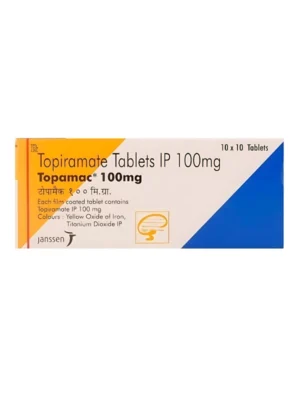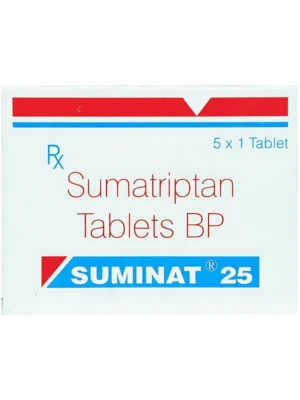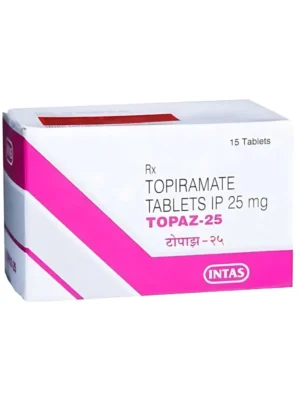Description
Sumatriptan 100 Tablet (Sumatriptan Succinate) – Treatment for Migraine Headaches
Sumatriptan 100 Tablet is a trusted medication used to relieve migraine headaches and prevent symptoms from worsening. It works by narrowing the blood vessels in the brain, reducing pain signals and associated discomfort. This fast-acting tablet helps alleviate throbbing headaches, nausea, and sensitivity to light or sound, providing quick relief during migraine attacks. Always take it as prescribed by your doctor and follow recommended dosage guidelines. Sumatriptan is not meant for preventing migraines but is highly effective in treating acute episodes. Consult your healthcare provider before use, especially if you have heart conditions, high blood pressure, or are pregnant.
Uses of Sumatriptan 100 Tablet:
Benefits of Sumatriptan 100 Tablet:
- Rapidly reduces migraine pain
- Helps relieve nausea and light/sound sensitivity
- Prevents migraine symptoms from worsening
Side Effects of Sumatriptan 100 Tablet:
Most side effects are mild and temporary. Common side effects include:
- Dizziness
- Weakness
- Flushing (warmth in face, ears, neck)
- Drowsiness
- Tingling or numbness in hands/feet
Consult your doctor if these persist or worsen.
How to Use Sumatriptan 100 Tablet?
Take this tablet as directed by your doctor, with or without food. Swallow it whole—do not chew, crush, or break it. For best results, take it at the first sign of a migraine attack. Do not exceed the prescribed dose.
How Sumatriptan 100 Tablet Works?
Migraine headaches occur due to swollen blood vessels in the brain. Sumatriptan works by constricting these blood vessels, blocking pain signals, and inhibiting chemicals that cause nausea and other migraine symptoms. This action provides rapid relief from migraine attacks.
Safety Advice:
- Alcohol: Unsafe – May cause excessive drowsiness.
- Pregnancy: Unsafe – Consult a doctor before use.
- Breastfeeding: Safe if prescribed – Minimal transfer to breast milk.
- Driving: Unsafe – May cause dizziness or drowsiness.
- Kidney/Liver: Use with caution – Consult a doctor.
Drug Interactions:
Avoid taking Sumatriptan with:
- Tranylcypromine, Selegiline: Risk of serotonin syndrome.
- Tapentadol, Linezolid: May cause severe reactions.
- Codergocrine Mesylate: Can cause blood vessel constriction.
What If You Missed a Dose?
Take the missed dose as soon as you remember. If it’s almost time for the next dose, skip the missed one. Do not double the dose.
FAQs:
Q1. What are the symptoms of Sumatriptan 100 overdose?
Overdose may cause fainting, dizziness, slow heartbeat, vomiting, or loss of bladder control. Seek emergency help if suspected.
Q2. When should I take Sumatriptan during a migraine attack?
Take it as soon as migraine symptoms appear. Do not use it to prevent migraines.
Q3. Can Sumatriptan 100 prevent migraines?
No, it only treats acute migraine attacks, not prevention.
Q4. What should I tell my doctor before taking Sumatriptan?
Inform them about heart conditions, high blood pressure, liver/kidney disease, or if you take antidepressants.
Q5. Does Sumatriptan increase blood pressure?
It may raise blood pressure in some patients. Monitor regularly.
Q6. What triggers migraines?
Common triggers include stress, hormonal changes, lack of sleep, alcohol, caffeine withdrawal, or bright lights.
Q7. Can I take other migraine medicines with Sumatriptan?
Avoid combining with other triptans—may increase heart risks.
Q8. Is migraine hereditary?
Yes, migraines often run in families, especially in women.
Q9. How do I know a migraine is starting?
Some experience aura—flashing lights, tingling, dizziness, or speech difficulties before an attack.








There are no reviews yet.